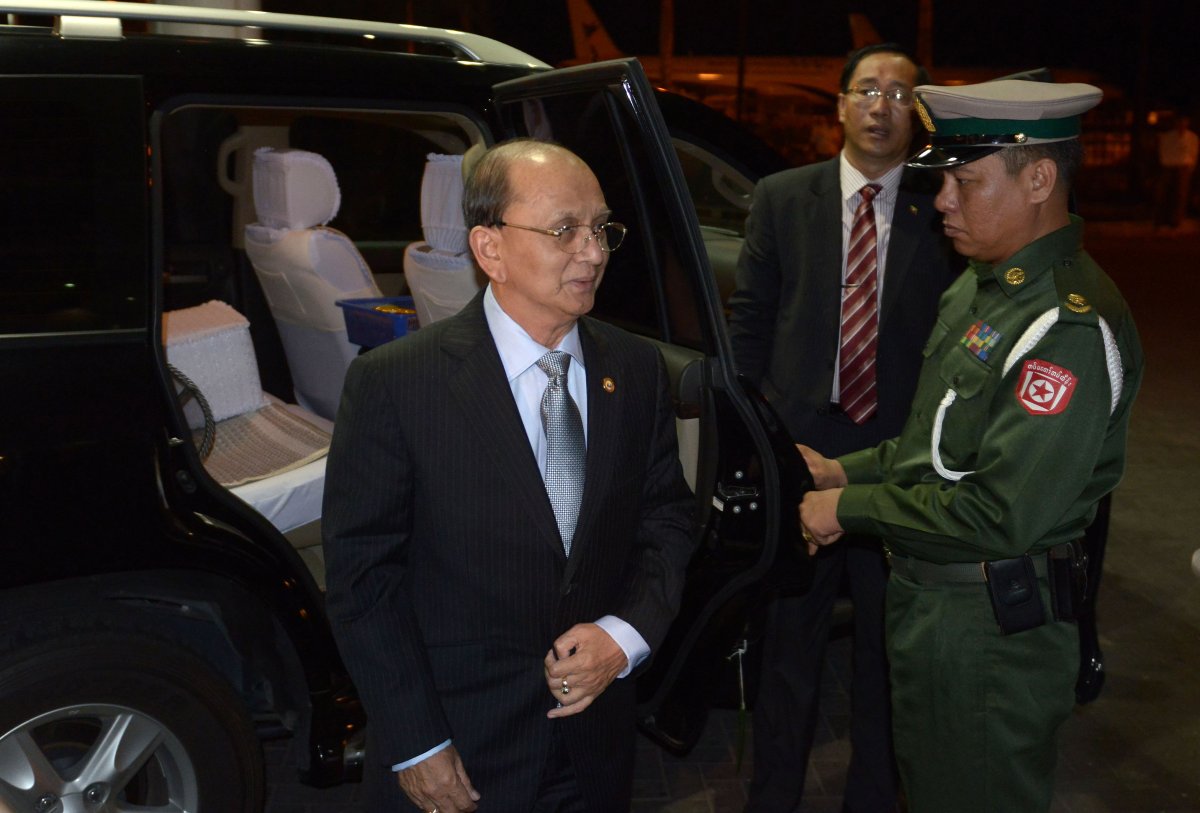WASHINGTON – Former general Thein Sein on Monday becomes the first Myanmar president to be welcomed to the White House in almost 47 years, crowning a dramatic diplomatic rehabilitation for his nation after years of international isolation.

But activists are angry about President Barack Obama hosting Thein Sein, and lawmakers are wary. The Myanmar leader has led the shift from decades of direct military rule, but has stalled on some reform commitments and failed to stop bloody outbursts of ethnic violence.
Thein Sein previously served in a repressive junta, and his meetings at the White House and Congress would have been all-but-impossible before he took the helm of a nominally civilian government in 2011. His name was only deleted from a blacklist barring travel to the U.S. last September.
He arrived in Washington Saturday, six months after Obama made history with an unprecedented U.S. presidential visit to the country also known as Burma. The administration’s outreach to Myanmar’s generals has provided an important incentive for the military to loosen controls on citizens and reduce dependence on China.
Myanmar has been rewarded by relaxation of tough economic sanctions, and Thein Sein will be addressing American businessmen keen to capitalize on the opening of one of Asia’s few untapped markets.
“President Thein Sein’s visit underscores President Obama’s commitment to supporting and assisting those governments that make the important decision to embrace reform,” the White House said in its announcement of Monday’s visit.
It will be the first by a Myanmar leader since a September 1966 visit by Ne Win, an independence hero-turned dictator, who began the nation’s descent from regional rice bowl to economic basket case. Thein Sein visited New York last September for the U.N. General Assembly but didn’t come to Washington.
The U.S. last month announced it is considering duty-free access for Myanmar to U.S. markets, and there could be progress Monday toward a bilateral trade and investment framework agreement.
The most significant outcome of Thein Sein’s trip could be a symbolic one. Obama is expected to use “Myanmar” – the country name adopted by the junta in 1989 – when he meets Thein Sein. However, the U.S. will keep using “Burma” in official documents.
Thein Sein will be accorded the protocol due to a foreign president, yet his Washington welcome will pale next to that granted last September to Nobel laureate Aung San Suu Kyi, the opposition leader who met Obama and was presented by Congress with the highest civilian award it can bestow.
Human rights activists and Myanmar campaigners have sharply criticized the administration for inviting Thein Sein, arguing it sends the wrong message and wastes leverage to press for further democratic change. The administration says it is important to signal U.S. support for his reform agenda, likely still opposed by military hardliners.
Thein Sein told the Washington Post in an interview Sunday that the military “will always have a special place” in government.
The military governed Myanmar for five decades and retains a quarter of parliamentary seats, giving it an effective veto over constitutional amendments – including changes that would be required to allow Suu Kyi to run for the presidency in crucial 2015 elections.
Outside the White House on Monday, about 30 activists opposing Thein Sein’s visit protested corruption in the government and treatment of ethnic Kachins in a northern region blighted by fighting between army and rebel forces. “We need real changes in Burma to stop the violations,” said an organizer of the rally, Ye Htut of the International Foundation for Burma National Congress.
Ahead of Thein Sein’s trip, Myanmar released at least 19 political prisoners in what has become a pattern for amnesties that coincide with high-profile international meetings as a way of highlighting the government’s benevolent policies. Right groups say at least 160 political detainees are still held.
The government has permitted the International Committee of the Red Cross access to its notorious prisons for the first time in seven years. But hasn’t allowed adequate humanitarian access to conflict zones where tens of thousands have been displaced. Authorities have failed to stop, and may have abetted in some cases, an explosion in communal violence that has killed hundreds and led to segregation of Muslim communities.
The U.S. State Department on Monday again designated Myanmar as a country of special concern for its severe violations of religious freedom, as it has since 1999 in an annual global assessment. It said the government promoted Buddhism, practiced by the majority, over minority faiths that include Islam.
The department said there were credible allegations of the involvement of local border security authorities in the burning of villages during the communal violence in western Rakhine State, and of Muslims being arbitrarily detained since June, and reportedly denied food, water, and sleep. Some deaths in custody were reported, the department said.
The U.S. Campaign for Burma said Thein Sein’s trip follows a troubling downward trend in Myanmar, and that “instead of honouring an abusive leader” the U.S. should tie its concessions to conditions.
Thein Sein told the Post that allegations the Myanmar army condones or even participates in ethnic pogroms against the nation’s Muslim minority were a “pure fabrication.”




Comments